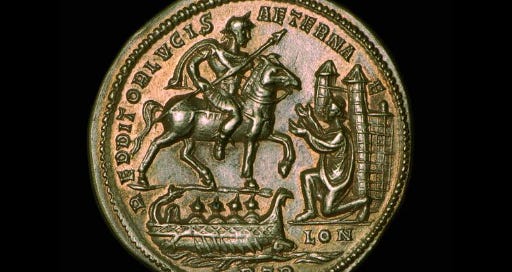3-1. The Successors of Constantine
DEATH had surprised Constantine when preparing to meet Persian aggression on the Eastern frontier and it seems certain that the Emperor had made no final provision for the succession to the throne, though later writers profess to know of a will which parcelled out the Roman world among the members of his family. During his lifetime his three sons had been created Caesars and while for his nephew Hanniballianus he had fashioned a kingdom in Asia, to his nephew Delmatius had been assigned the Ripa Gothica. Possibly we are to see in these latter appointments an attempt to satisfy discontent at Court; it may be that Optatus and Ablabius, espousing the cause of a younger branch of the imperial stock, had forced Constantine's hand and that it was for this interference that they afterwards paid the penalty of their lives.
But it would seem a more probable suggestion that the Persian danger was thought to demand an older and more experienced governor than Constantius, while the boy Constans was deemed unequal to withstand the Goths in the north. At least the plan would appear to have been in substance that of a threefold division of spheres itself suggested by administrative necessity; Constantine was true to the principle of Diocletian, and it was only a superficial view which saw in this devolution of the central power a partition of the Roman Empire. Thus on the Emperor's death there followed an interregnum of nearly four months. Constantine had, however, been successful in inspiring his soldiers with his own dynastic views; they feared new tumult and internal struggle and in face of the twenty-year-old Constantius felt themselves to be the masters. The armies agreed that they would have none but the sons of Constantine to rule over them, and at one blow they murdered all the other relatives of the dead Emperor save only the child Julian and Gallus the future Caesar; in the latter's case men looked to his own ill-health to spare the executioner. At the same time perished Optatus and Ablabius. On 9 September 337 Constantius, Constantine II, and Constans each assumed the title of Augustus as joint Emperors.
His contemporaries were unable to agree how far Constantius was to be held responsible for this assassination. He alone of the sons of Constantine was present in the capital, it was he who stood to gain most by the deed, the property of the victims fell into his hands, while it was said that he himself regarded his ill-success in war and his childlessness as Heaven's punishment and that this murder was one of the three sins which he regretted on his death-bed. In later times some, though considering the slaughter as directly inspired by the Emperor, have yet held him justified and have viewed him as the victim of a tragic necessity of state. Certainty is impossible but the circumstances suggest that inaction and not participation is the true charge against Constantius; the army which made and unmade emperors was determined that there should be no rival to question their choice. The massacre had fatal consequences; it was the seed from which sprang Julian's mistrust and ill-will: in a panegyric written for the Emperor's eye he might admit the plea of compulsion, but the deep-seated conviction remained that he was left an orphan through his cousin's crime.
In the summer of 338 the new rulers assembled in Pannonia (or possibly at Viminacium in Dacia, not far from the Pannonian frontier) to determine their spheres of government. According to their father's division, it would seem, Spain, Britain, and the two Gauls fell to Constantine: the two Italies, Africa, Illyricum, and Thrace were subjected to Constans, while southward from the Propontis, Asia and the Orient with Pontus and Egypt were entrusted to Constantius. It was thus to Constantius that, on the death of Hanniballianus, Armenia and the neighbouring allied tribes naturally passed, but with this addition the eastern Augustus appears to have remained content. The whole of the territory subject to Delmatius, i.e. the Ripa Gothica which probably comprised Dacia, Moesia I and II, and Scythia (perhaps even Pannonia and Noricum) went to swell the share of Constans who was now but fifteen years of age.
But though both the old and the new Rome were thus in the hands of the most youthful of the three emperors, the balance of actual power still seemed heavily weighted in favour of Constantine, the ruler of the West; indeed, he appears to have assumed the position of guardian over his younger brother. It may be difficult to account for the moderation of Constantius, but Julian points out that a war with Persia was imminent, the army was disorganised, and the preparations for the campaign insufficient; domestic peace was the Empire's great need, while Constantius himself really strengthened his own position by renouncing further claims: to widen his sphere of government might have only served to limit his moral authority.
Further he was perhaps unwilling to demand for himself a capital in which his kinsmen had been so recently murdered: his self-denial should prove his innocence. During the next thirteen years three great and more or less independent interests absorbed the energies of Constantius, the welfare and doctrine of the Christian Church, the long drawn and largely ineffective struggle against Persia, and lastly, the assertion and maintenance of his personal influence in the affairs of the West.
To obtain a deluxe leatherbound edition of THE CAMBRIDGE HISTORY OF THE BYZANTINE EMPIRE, subscribe to Castalia History.





